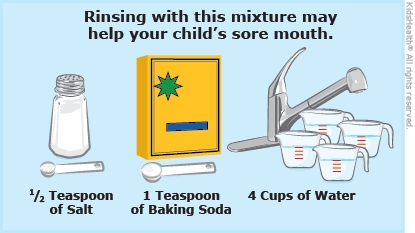Chemo-Related Mucositis: How to Care for Your Child
Mucositis (myoo-kuh-SY-tiss) is soreness and swelling of the lining of the mouth and sometimes the rest of the digestive tract. It's a common side effect of chemotherapy. The soreness makes swallowing painful. Medicine can help with pain and make it easier to eat and drink. You can help make your child more comfortable at home.


-
Use prescription pain medicines as directed.
-
When giving your child a prescription pain medicine, talk to the doctor or pharmacist before also using acetaminophen (brand names include Tylenol®). Some prescription pain medicines contain acetaminophen, and taking two medicines with acetaminophen could cause your child to get too much.
-
Food suggestions:
-
Avoid foods with hard, sharp, or dry textures (like potato chips) or that are spicy, acidic (like orange juice), or salty (like tomato sauce).
-
Offer your child soft, bland foods such as pudding, mashed potatoes, bananas, eggs, smoothies, milkshakes, and pureed soups.
-
Serve food cold or at room temperature.
-
Offer four or five small meals instead of three large ones.
-
For mouth and throat pain:
-
Use a moisturizer or balm on lips.
-
Offer your child water, ice chips, or ice pops often throughout the day. Using a straw can help make swallowing liquids easier.
-
If your child is old enough to rinse and spit, make a mixture of ½ teaspoon of salt, 1 teaspoon of baking soda and 4 cups of water and have your child rinse and spit. Rinse the mouth with a little bit of this mixture 4–6 times a day. Refrigerate between uses and make a new batch every 24 hours.
-
After meals, gently clean your child's teeth and mouth with a soft-bristled toothbrush; a soft, damp cloth; or a tooth sponge. You may use or skip toothpaste, depending on what is most comfortable for your child. Rinse with water after cleaning.
-
Skip flossing if it causes bleeding or pain.
-
Do not give your child store-bought mouthwashes unless recommended by your doctor.


You have questions, or your child:
-
can't eat, drink, or swallow
-
is awake at night because of pain
-
has swelling, color changes, or white patches in the mouth
-
has pain that doesn't get better with medicine
-
has pain that gets worse
-
has bloody or black stools (poop)
-
has a fever above:
-
101ºF (38.3ºC) when taken by mouth once, or 100.4ºF (38ºC) when taken by mouth two times at least 1 hour apart
-
100.4ºF (38ºC) when taken under the arm once, or 100ºF (37.8ºC) when taken under the arm two times at least 1 hour apart

Your child:
-
has bloody or black vomit
-
appears dehydrated; signs include dizziness, drowsiness, a dry or sticky mouth, sunken eyes, crying with little or no tears, or peeing less often (or having fewer wet diapers)

What symptoms do kids with mucositis get? Kids may have:
-
mouth sores
-
red gums
-
bleeding in the mouth
-
a sore throat that makes it hard to swallow
-
stomach pain, chest pain, diarrhea, or pain in the anus
Can a child with mucositis have dental care?
-
Certain times during cancer treatment are better than others for dental visits. Follow your health care provider's instructions on when to have dental visits.
-
Your child should not wear a retainer or other removable piece of dental equipment while on chemo unless the doctor says it's OK.
How long does mucositis last? Mucositis usually lasts 1–2 weeks.